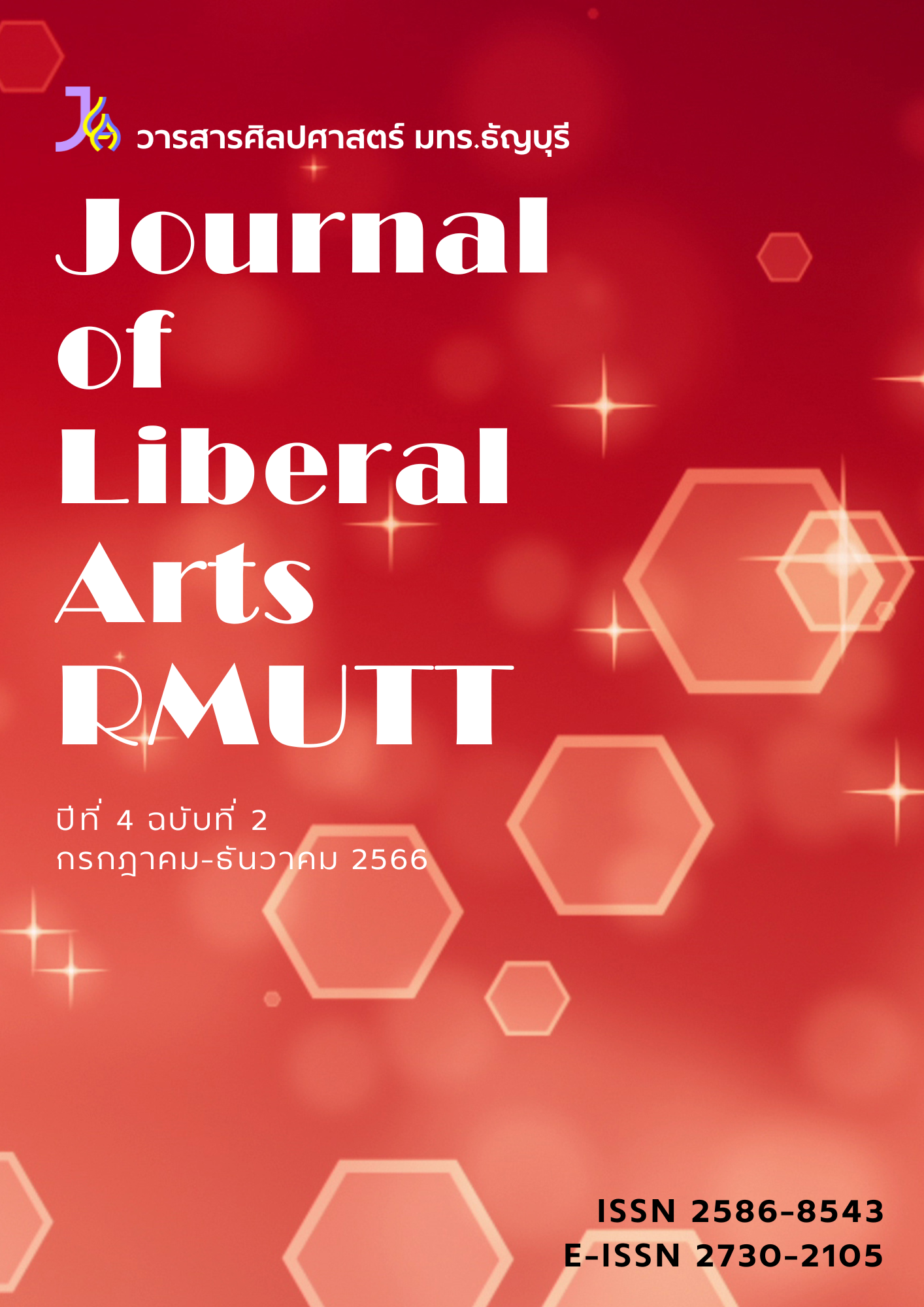Storytelling of Camping Tourism Towards Sustainable Tourism Management
DOI:
https://doi.org/10.60101/jla.2023.4.2.3201Keywords:
storytelling, camping tourism, sustainable tourism managementAbstract
This research aimed to study the stories of campers and provide guidelines for sustainable camping tourism management. Through the storytelling of the experience of camping tourism, the researcher reflected the thoughts of the group of camping tourists, in which the researcher had the status of an "inside group" (Emic) by means of Critical Autoethnography. The sample group included 15 campers with more than 3 years of experience. The research instruments were informal in-depth interviews with emphasis on dialogue and mutual experience along with participant observation. The results showed that with current social trends, the form of camping tourism has changed regarding both physical characteristics such as camping sites, equipment, and facilities as well as the behavioral characteristics of the new generation of campers. As a result, there must be a guideline for managing such tourism to be sustainable, covering all 4 dimensions: 1) Sustainable management, 2) Maximizing benefits and reducing negative social impacts, 3) Increasing benefits and reducing negative cultural impacts on communities and tourists, and 4) increasing benefits and reducing negative impacts on the environment to maximize the benefits from sustainable and persistent camping.
References
กระทรวงการท่องเที่ยวและกีฬา. (2566). รายงานฉบับสมบูรณ์ โครงการเพื่อการส่งเสริมการท่องเที่ยวอย่างยั่งยืน. สืบค้นเมื่อ 25 สิงหาคม 2566, จาก https://www.mots.go.th/ProjectToPromoteSustainableTourism.pdf
กัญญาพัชร์ พัฒนาโภคินสกุล, สุภัทรา สังข์ทอง และนิมิต ซุ้นสั้น. (2565). การพัฒนาแกลมปิ้งเพื่อการท่องเที่ยว. วารสารเพื่อการพัฒนาการท่องเที่ยวสู่ความยั่งยืน, 4(2), 94-109.
ชลธร ชำนาญคิด และอนุชยา ชำนาญคิด. (2559). การศึกษาปรับปรุงและบังคับใช้กฎระเบียบและมาตรการพิเศษเพื่อสนับสนุนให้เกิดการท่องเที่ยวอย่างยั่งยืนในอุทยานแห่งชาติเขาใหญ่. (รายงานการวิจัย). กรุงเทพฯ: สำนักงานคณะกรรมการส่งเสริมวิทยาศาสตร์ วิจัยและนวัตกรรม.
ชวลิต อภิหิรัญตระกูล และต่อลาภ คำโย. (2565). การประเมินขีดความสามารถในการรองรับได้ของแหล่งท่องเที่ยวในอุทยานแห่งชาติแม่เงา จังหวัดแม่ฮ่องสอน. วารสารวิจัยและพัฒนา มหาวิทยาลัยราชภัฏเลย, 17(59), 41-51.
ชวลีย์ ณ ถลาง. (2564). แนวทางในการพัฒนาการท่องเที่ยวอย่างยั่งยืนของเกาะช้าง จังหวัดตราด. วารสารบัณฑิตศึกษา มหาวิทยาลัยราชภัฏวไลยอลงกรณ์ ในพระบรมราชูปถัมภ์, 15(1), 25-37.
ชานนท์ นัยนา. (2561). การจัดการการท่องเที่ยวอย่างยั่งยืน กรณีศึกษาบางกะเจ้า. (วิทยานิพนธ์ปริญญามหาบัณฑิต). มหาวิทยาลัยธรรมศาสตร์, กรุงเทพฯ.
ณฐอัมรัตน์ อินทบำรุง และชมภูนุช หุ่นนาค. (2564). แนวทางการพัฒนาการท่องเที่ยวอย่างยั่งยืนของเกาะสมุย. Journal of Administrative and Management Innovation, 9(2), 82-96.
ธรรมจักร เล็กบรรจง, วันวิสาข์ พลอย อินสว่าง และจิระนาถ รุ่งช่วง. (2565). การพัฒนารูปแบบการมีส่วนร่วมในการจัดการการท่องเที่ยวเชิงเกษตรอย่างยั่งยืนของชุมชนนาหมื่นศรี อำเภอนาโยง จังหวัดตรัง. วารสารศิลปศาสตร์ มหาวิทยาลัยธรรมศาสตร์, 22(3), 81-110.
บุษกร เชี่ยวจินดากานต์. (2561). เทคนิคการวิจัยเชิงคุณภาพแบบกรณีศึกษา. วารสารศิลปศาสตร์ปริทัศน์, 13(25), 103-118.
วนัฎภรณ์ ทองฤทธิ์. (2564). ผลกระทบของ Covid-19 ต่อสิ่งแวดล้อมทางธรรมชาติและการท่องเที่ยวกรณีศึกษา : หาดนพรัตน์ธารา-หมู่เกาะพีพี จังหวัดกระบี่. (วิทยานิพนธ์ปริญญามหาบัณฑิต). สถาบันบัณฑิตพัฒนบริหารศาสตร์, กรุงเทพฯ.
สิทธิชัย สวัสดิ์แสน และปริญญา นาคปฐม (2565). แนวทางการพัฒนาการท่องเที่ยวอย่างยั่งยืนจังหวัดนครนายกภายหลังสถานการณ์โควิด-19. วารสารเพื่อการพัฒนาการท่องเที่ยวสู่ความยั่งยืน, 4(2), 38-55.
สุจิตรา ยางนอก, ลัญจกร นิลกาญจน์ และปัญญา เลิศไกร. (2566). การจัดการท่องเที่ยวโดยชุมชนแบบยั่งยืน. มนุษย์สังคมสาร (มสส.), 21(2), 279-300.
สุรางคนา ศรีสุทธิ. (2563). แผนธุรกิจ Home Camping (ธุรกิจแกลมปิ้ง และแคมป์ปิ้ง). (วิทยานิพนธ์ปริญญามหาบัณฑิต). มหาวิทยาลัยกรุงเทพ, กรุงเทพฯ
Bangkok Bank SME. (2565). ธุรกิจ Camping รับเทรนด์ท่องเที่ยวหลังโควิด-19. SME start up. สืบค้นเมื่อ 17 มกราคม 2566, จาก https://www.bangkokbanksme.com/en/8start-ajar-technique-to-create-a-business-camping
Colaizzi, P. (1987). Psychological research as the Phenomenologist views it. In Valle R. & King M. (eds). Existential – Phenomenological Alternatives for Psychology. (pp.48-71). Oxford: Oxford University Press, London.
Font, X., Montano, L., Wu, J., Woosnam, A.C.K, & Li, S. (2023). The Purpose of a Sustainable Tourism Journal. Journal of Sustainable Tourism, 31(1), 1-13.
Global Sustainable Tourism Council: GSTC. (2566). Global Sustainable Tourism Criteria for Destination. Retrieved on January 19, 2023, from https://www.gstcouncil.org/
Khan, M. R., Khan, H. U. R., Lim, C. K., Tan, K. L., & Ahmed, M. F. (2021). Sustainable Tourism Policy, Destination Management and Sustainable Tourism Development: A Moderated-mediation Model. Sustainability, 13(21), 12156. https://doi.org/10.3390/su132112156
Macmillan, T. (1971). The Delphi Technique: Paper Presented at the Annual Meeting of the California Junior Colleges Associations Committee on Research and Development. Monterey: California.
Rogerson, C.M. and Rogerson, J.M. (2020). Camping Tourism: A Review of Recent International Scholarship. Geo Journal of Tourism and Geosites, 28(1), 349-359. https://doi.org/10.30892/gtg.28127-474
White, M.P, Alcock, I., Grellier, J., Wheeler, B.W., Hartig, T., Warber, S. L., Bone, A., Depledge, M.H. & Fleming, L.E. (2019). Spending at Least 120 Minutes a Week in Nature is Associated with Good Health and Well-being. Scientific Reports, 9, 7730. https://doi.org/10.1038/s41598-019-44097-3
Downloads
Published
How to Cite
Issue
Section
License
Copyright (c) 2023 Journal of Liberal Arts RMUTT

This work is licensed under a Creative Commons Attribution-NonCommercial-NoDerivatives 4.0 International License.













